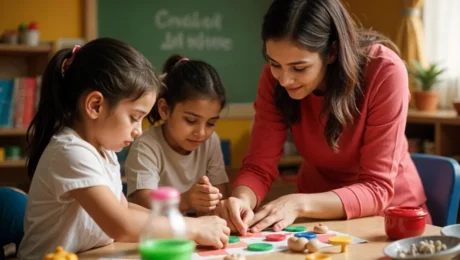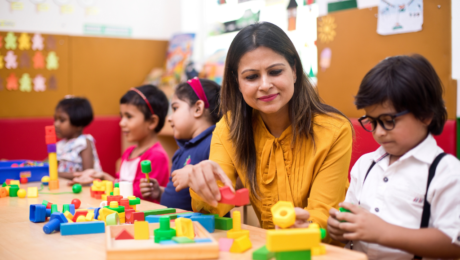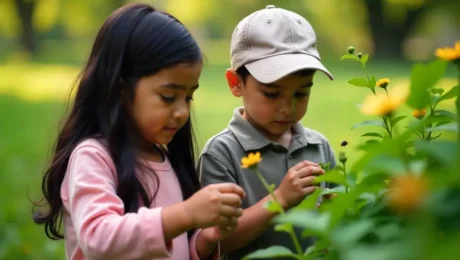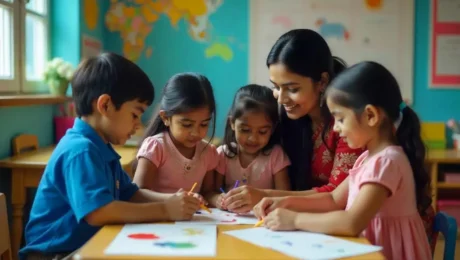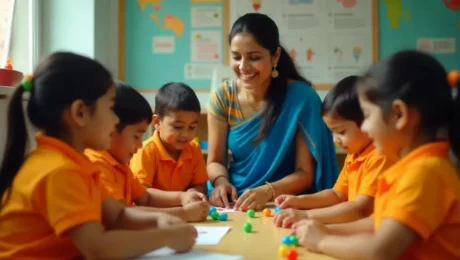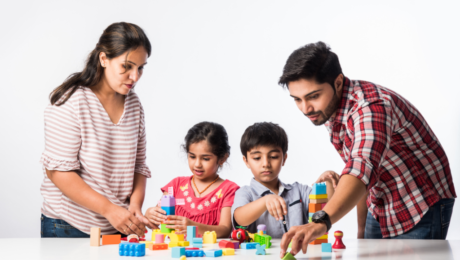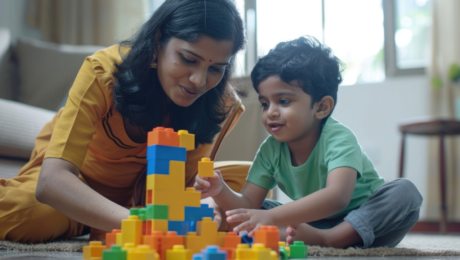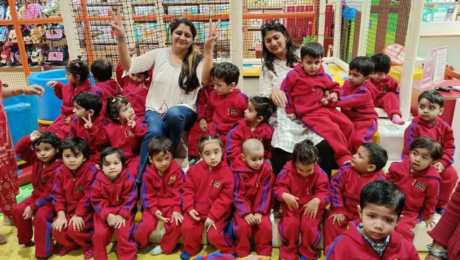Day Boarding Schools Noida: Nurturing Young Minds Beyond Academics
As parents, we wear many hats, from scheduling school pick-ups to planning after-school activities while trying to squeeze in our own work commitments. It’s like a juggling act that never seems to stop. But what if there was a place where your child could learn, grow, play, and thrive all under one roof? That’s exactly what day boarding schools in Noida offer.
In this article, we will look at some key features to consider before enrolling your child in a day boarding school in Noida. So, let’s get started!
Key Features to Look for in a Day Boarding School
When selecting a day boarding school, evaluating various features can help parents choose the right environment for their child’s holistic development. The following are some of the key features to look for:
Academic Excellence and Curriculum
Most importantly, look for schools that offer a balanced curriculum, along with physical activities and creative exploration. Schools affiliated with recognized boards are a plus.
Experienced and Qualified Faculty
Ensure the school employs experienced, well-trained educators who foster a nurturing learning environment.
State-of-the-Art Infrastructure
Modern facilities enhance the learning experience. Check for well-equipped classrooms, science and computer labs, libraries, and dedicated spaces for arts and sports. Ample playgrounds and creative spaces support both academic and extracurricular engagement.
Safety and Security Measures
Safety is paramount in a day boarding school. Schools should have comprehensive security measures, including CCTV surveillance, secure entry points, and trained security personnel. Regular safety drills and on-site medical support further enhance student safety.
Personalized Attention and Student Support
A low student-teacher ratio allows for personalized attention, ensuring each child receives the support they need. Counseling services and remedial programs can help address emotional challenges and academic difficulties.
Nutritious Meal and Nutrition Programs
Healthy meals are essential for a child’s physical well-being and focus. Schools should offer nutritious, hygienically prepared meals while catering to dietary restrictions and allergies. Proper meal planning promotes healthy eating habits from an early age.
Selecting the right day boarding school requires a careful balance of academic rigor, extracurricular opportunities, safety, and values. By considering these key features, parents can ensure their child receives a comprehensive education that fosters growth and prepares them for future success.
Also read: Discover the Top Benefits of Enrolling Your Child in a Day Boarding School in Noida
Benefits of Enrolling Your Children at Day Boarding School in Noida
Enrolling your child in a day boarding school in Noida can provide a well-rounded educational experience beyond traditional schooling. Here are key advantages to consider:
Academic Excellence and Holistic Development
Day boarding schools in Noida are renowned for offering structured learning environments that foster academic growth and extracurricular engagement. These schools encourage the development of critical thinking, creativity, and problem-solving skills.
Well-Structured Daily Routine
With a well-organized schedule combining academics, co-curricular activities, and relaxation, children develop a balanced approach to learning and life. The extended hours in a supervised environment help students maintain discipline and focus.
Individual Attention
Smaller class sizes and extended teacher-student interaction time allow educators to provide personalized attention to students. This ensures tailored learning strategies that cater to each child’s unique needs and pace.
Exposure to Extracurricular Activities
From sports to arts and crafts, robotics, and music, day boarding schools offer diverse opportunities for children to explore their interests and develop new skills, fostering a balanced personality.
Enhanced Social Skills
Longer hours spent in the school environment encourage children to build stronger relationships with peers and mentors, improving communication skills and teamwork abilities.
Focus on Physical Fitness and Wellness
With designated time for sports and recreational activities, day boarding schools promote physical fitness and overall well-being. Many institutions also provide nutritious meals to support healthy development.
Safe and Secure Environment
Most day boarding schools in Noida prioritize the safety and security of children with advanced surveillance systems and vigilant staff, giving parents peace of mind.
Time Management and Independence
Students learn to manage their time efficiently, balancing academics, hobbies, and relaxation. The structured environment nurtures a sense of responsibility and independence.
Academic Support Beyond School Hours
Day boarding schools often provide supervised study sessions and access to educational resources, ensuring that students complete assignments and reinforce their learning under expert guidance.
Parental Convenience
For working parents, day boarding schools offer a convenient solution by providing extended care for children in a productive and supervised environment, reducing the need for after-school childcare.
Choosing a day boarding school in Noida provides children with a comprehensive learning experience that supports their academic, social, and personal development. The combination of expert guidance, diverse activities, and a secure environment prepares students for a bright future.
- Published in Top Play School
Play School in Noida: Where Joy and Learning Goes Hand in Hand
Are you looking for the perfect playschool in Noida? Well, you are in the right place! Choosing a play school is not just about finding the right place where your child can spend his/her mornings. It is also about finding a nurturing environment where they will laugh, learn, and grow. Noida is buzzing with fantastic options, but honestly, it gets overwhelming to decide which one is the best fit. So, whether you are looking for a curriculum that sparks creativity, teachers who feel like family, or activities that make learning fun, we have got you covered. Let’s dive into some of the best play schools in Noida and find the ultimate launchpad for your child’s bright future.
Top 5 Best Play Schools in Noida
The list of the top 5 best play schools in Noida is as follows:
Little Scholar
Little Scholar is a nurturing educational space in Noida designed to inspire young minds and foster holistic development. With a child-centric approach, the playschool offers a stimulating environment where creativity, curiosity, and confidence thrive. The curriculum blends structured learning with play-based activities, encouraging cognitive, social, and emotional growth. Experienced educators ensure every child feels valued and supported, laying a strong foundation for lifelong learning. Little Scholar also emphasizes values, teamwork, and individuality, creating a well-rounded experience. Modern facilities, safe infrastructure, and engaging programs make it a trusted choice for parents seeking quality early education for their little ones.
EuroKids Preschool
EuroKids is a play school in Greater Noida. It is known for offering a fun and engaging learning environment tailored to young children. With its innovative curriculum, the school fosters holistic development through play-based learning and creative activities. It emphasizes safety, hygiene, and a nurturing atmosphere, ensuring children feel secure while exploring their potential. The school integrates modern teaching methods with traditional values to build a strong foundation for early education. Additionally, EuroKids provides age-appropriate programs for toddlers and preschoolers, encouraging intellectual, emotional, and social growth in a vibrant and inclusive setting.
Maple Bear Canadian Preschool
Maple Bear Canadian Preschool in Greater Noida stands out for its globally acclaimed Canadian curriculum, which combines academic excellence with a nurturing environment. It focuses on experiential and bilingual learning, encouraging creativity, problem-solving, and communication skills in young learners. The school provides age-appropriate programs for toddlers and preschoolers, fostering intellectual, emotional, and social growth. With a strong emphasis on safety, hygiene, and an engaging infrastructure, Maple Bear ensures a warm, inclusive setting where children thrive. It’s a trusted choice for parents seeking a comprehensive early education for their children.
Also Read: The Little Scholar Playschool- Best Noida Preschool
Pehal Preschool
Pehal Preschool in Greater Noida is a vibrant and nurturing early learning institution designed to foster a child’s intellectual, emotional, and social growth. Known for its serene green surroundings and spacious play areas, Pehal offers an enriching environment for young minds to explore and learn. The school’s curriculum emphasizes experiential learning, creativity, and interactive activities encouraging holistic development. With a strong focus on safety and hygiene, Pehal provides a secure space where children can thrive while building a solid foundation for their academic journey.
Modern Montessori International (MMI) Noida
Modern Montessori International (MMI) is one of the premier preschools in Noida. It is known for its globally recognized Montessori teaching methodology. Focused on fostering independence and creativity, MMI provides an engaging and child-centric learning environment. The school emphasizes individualized attention, allowing children to learn independently while developing critical thinking and problem-solving skills. With state-of-the-art facilities, experienced educators, and a focus on holistic growth, MMI ensures a nurturing space for young learners. It’s an excellent choice for parents seeking a blend of traditional Montessori principles and modern educational practices.
FAQs:
Which school is the best play school in Noida?
Little Scholar is one of the best play schools in Noida. Apart from that, you can also opt for Modern Montessori International or Maple Bear Canadian Preschool in Noida and Greater Noida.
Average fees of play school in Noida?
The average yearly fees of a play school in Noida can range from INR. 15,000 to INR. 1,49,000, depending on its quality and infrastructure.
Should I enroll my child in a play school in Noida?
Yes, enrolling your child in a play school can benefit him/her. You may also enroll your child at a daycare in Noida, which will prepare your child for play school.
- Published in Top Play School
Finding the Best Daycare Near Me: Where Little Smiles Grow Big!
We all know the heart-wrenching feeling of leaving your little one behind as you step out to conquer the world. In the words of Oprah Winfrey, “The best gift you can give to your children is your time.” But the reality speaks something else. With hectic work schedules and managing responsibilities, giving proper time to our children often gets very difficult. That’s where a daycare center comes to your rescue. The right daycare center will offer a nurturing environment to your children and focus on their overall development. If you are constantly searching for “Best daycare near me” online, this article might be the right one for you. In this article, we have covered some of the best daycare centers in Noida. If you are a resident of Noida, this article might help you to choose the best daycare for your child.
Top 5 Best Daycare Centers in Noida
Here is a list of top 5 best day care centers of Noida. If you are from Noida and searching for ‘best daycare centres near me’, you have arrived at the right spot.
Little Scholar Preschool and Daycare
Little Scholar Preschool and Daycare in Noida is a trusted institution offering a nurturing and safe environment for children aged 1.5 to 5 years. Known for its experienced staff and child-friendly infrastructure, it provides a well-rounded curriculum focusing on academics, physical activities, and creative learning. The daycare is equipped with CCTV surveillance, ensuring safety and transparency for parents. Children benefit from engaging in activities that enhance social, emotional, and cognitive skills, making it a preferred choice for working parents in the region. Little Scholar emphasizes a homely atmosphere combined with educational excellence to prepare children for formal schooling.
KLAY Preschool and Daycare
KLAY Preschool and Daycare is a leading childcare center in Noida, designed to support the holistic development of children aged 6 months to 6 years. With a structured curriculum that combines academics and play, it nurtures cognitive, social, and emotional growth. The daycare offers a secure environment with live CCTV access for parents, well-trained staff, and hygienic premises. Activities like art, storytelling, and outdoor play are tailored to enhance creativity and motor skills. KLAY is a trusted choice for working parents, ensuring a safe, engaging, and stimulating atmosphere for children to thrive.
Footprints Childcare
Footprints Childcare is a premium daycare and preschool chain in Noida, catering to children aged 6 months to 6 years. Renowned for its technology-enabled services, it provides parents with live CCTV access for real-time monitoring. Footprints emphasize a holistic approach, offering a research-based curriculum to foster cognitive, physical, and emotional development. With a focus on safety and hygiene, the daycare also serves nutritious meals to ensure children’s well-being. Engaging activities such as yoga, storytelling, and art create a stimulating environment that supports early learning while addressing the needs of working parents.
Petals Preschool and Daycare
Petals Preschool and Daycare in Noida is a well-established childcare center offering a UK-based Early Years Foundation Stage (EYFS) curriculum for children aged 6 months to 10 years. It focuses on holistic development through play-based learning, fostering creativity, critical thinking, and social skills. The daycare provides a safe and nurturing environment with separate nap areas and freshly prepared, nutritious meals curated by an AIIMS-certified nutritionist. With a low child-to-staff ratio and emphasis on cleanliness and safety, Petals ensures personalized attention and a positive learning experience, making it a popular choice for working parents.
Also Read: What is a Daycare Center- Types and Benefits
Maple Bear Canadian Preschool
Maple Bear Canadian Preschool and Daycare in Noida offers a globally recognized curriculum that blends Canadian educational practices with local cultural elements. Designed for children aged 6 months to 6 years, it emphasizes bilingual learning, creativity, and cognitive development through play-based methodologies. The daycare ensures a safe, hygienic, and child-friendly environment with attentive staff and nutritious meal plans. Maple Bear focuses on holistic growth, fostering social, emotional, and academic skills, and preparing children for future success. Its reputation for high-quality education and care makes it a top choice for parents seeking comprehensive childcare solutions.
FAQs:
What are the best daycares near me?
If you are a resident of Noida, here are some of the best daycare centers in your city: Little Scholar, KLAY Preschool and Daycare, Footprints Childcare, Petals Preschool and Daycare, and Maple Bear Canadian Preschool.
How do I find the best daycare near me in Noida?
Follow the following steps in order to find the best daycare near your place in Noida:
- Look for daycare centers with good reviews.
- Look for recommendations from your friends and relatives.
- Visit the shortlisted daycare centers to understand the environment they will offer for your child.
- Consider your budget and choose the one that offers value for money.
- Published in Top Play School
Starting Early: Knowing The Right Preschool Age in India
When we think of preschools, the only thing that comes to our mind is those tiny backpacks and those tiny steps toward learning. Getting enrolled in a preschool is essential as it lays the foundation of a child’s academic and social development. What is more important is to know what is the right preschool age in India for getting your child enrolled.
In the words of Albert Einstein, “Education is not just about learning facts, but the training of the mind to think”. In a country as diverse as ours, where every state, religion, and culture offers something unique, the preschool journey is simply not about mugging up facts. It’s a fun, play-based learning experience for children where they are exposed to different cultures and circumstances. In this article, we will explore the preschool scenario in India and learn about the right age for preschool. So let’s get started!
What Does Preschool Education Look Like in India?
Preschool education in India has come a long way in the last few decades, evolving from informal daycare services to structured, activity-based learning environments. As parents increasingly recognize the importance of early childhood education, the landscape of preschools in India has diversified to cater to different learning needs, cultural contexts, and educational philosophies. Here’s a look at what preschool education typically looks like in India today:
Types of Preschool Institutions in India
- Nursery Schools / Play Schools.
- Montessori Schools.
- Kindergarten (KG).
- Play-Based and Activity-Based Preschools.
Key Features of Preschool Education in India
Play Based Learning: In India, a significant portion of preschool education is based on play-based learning. Research has shown that children learn best through play, as it stimulates their imagination, cognitive skills, and social development.
Focus on Socialization: Preschools in India put a strong emphasis on social skills. These early years are critical for children to learn how to interact with peers, share, and cooperate. Teachers guide children in developing positive relationships, learning about emotions, and expressing themselves appropriately.
Basic Academic Skills: While play-based learning dominates, preschools in India also focus on preparing children for formal schooling. Some of the early learning concepts include language development, numeracy skills, and general knowledge.
Motor and Cognitive Development: Preschools incorporate activities designed to build fine motor skills like drawing, cutting, and playing with clay and gross motor skills like running, jumping, and climbing. These activities are essential for physical development and coordination.
Emotional Growth: Preschools in India also emphasize emotional development. Teachers help children recognize and express their emotions, build self-confidence, and deal with challenges in a constructive way.
Also Read: First Step to a Bright Future: Exploring the Importance of Preschool Education
What is the Right Age for Preschool in India?
Identifying the best age to start preschool can be a challenging task for parents. In India, the ideal age for preschool typically falls between 3 to 6 years, but it depends on various factors like your child’s development, family needs, and the type of preschool program you choose. Here’s a closer look at the ideal preschool age and what to consider before making the decision.
The Typical Playschool Age Range in India
Preschool (Nursery or Kindergarten) in India is generally meant for children aged 3 to 6 years, and the age breakdown is typically as follows:
Playgroup (Age 2-3 years): Some preschools start at this age for children who are ready to begin socializing and learning basic routines. Playgroup is often the first introduction to formal education.
Nursery (Age 3-4 years): The most common starting point for many children, where they begin learning foundational skills like colors, shapes, and basic socialization.
Lower Kindergarten (LKG) (Age 4-5 years): This level introduces more structured learning, including basic reading, writing, and math concepts.
Upper Kindergarten (UKG) (Age 5-6 years): UKG prepares children for primary school by focusing on more formal academic skills, social development, and school readiness.
Preschool education in India is an exciting, diverse, and evolving field. It plays a critical role in the early development of children, laying the foundation for lifelong learning.
FAQs:
What age is best for playschool and kindergarten?
Usually, the best age for playschool and kindergarten is 2.5 to 3.5 years for play school and 3 to 4 years for kindergarten. However, it also depends on the child’s development and readiness for preschool.
What age is best to start play school?
The best age to start play school is between 3 to 5, but it also depends on the child’s development and overall readiness to go to playschool.
- Published in Top Play School
Eco-Fun for Little Ones: Best Green Day Activities for Kindergarten
Someone rightly said that children are like sponges. They soak up everything around them. So why not let me soak some environmental awareness through the Green Day celebration at preschools? Green Day activities for kindergarten are not just about wearing green outfits, but the bigger objective is to teach them the joy of nature, the importance of sustainability, and the magic of small, everyday actions that can make a difference.
So, if you are ready to spark some love for the environment within children through some fun and engaging activities, this article is for you. Read this article till the end to find out some interesting activities for Green Day and why these activities are important.
Why Do Green Day Activities Matter for Kindergarten?
Here’s why Green Day activities are important for kindergarten:
Fosters Early Environmental Awareness: Introducing young children to environmental concepts early helps them develop a sense of connection to the planet and an understanding of the importance of protecting it.
Teaches Responsibility and Stewardship: Through activities like planting or recycling, kids learn to take responsibility for their actions and how they impact the world around them, laying the foundation for lifelong eco-conscious habits.
Encourages Creativity and Problem-Solving: Green Day activities, such as creating art from recycled materials or designing eco-friendly projects, stimulate creativity while teaching kids to think critically about sustainability.
Promotes Physical Activity and Outdoor Exploration: Activities like nature walks get children outside, encouraging physical activity and helping them develop a deeper appreciation for nature.
Supports Cognitive and Social Skills Development: Hands-on, nature-based activities allow children to practice teamwork, problem-solving, and communication while learning about the environment interactively.
Builds a Foundation for Eco-Friendly Habits: Early exposure to sustainable practices, such as recycling, conserving resources, and reducing waste, helps kids form habits that will stay with them throughout their lives.
Strengthens Emotional Connections to Nature: When kids engage with nature, they often develop an emotional bond with it, fostering empathy for animals, plants, and ecosystems, which can motivate them to care for the Earth.
Encourages a Global Perspective: Teaching young children about environmental issues on a global scale, like climate change or deforestation, in an age-appropriate way helps them understand the broader implications of their actions.
Also Read: Making Unforgettable Memories: Fun Blue Day Activity for Preschool
Best Green Colour Day Activity for Kindergarten
Here is a list of some of the best Green Day activities for kindergarten at Little Scholar:
Green-themed Arts and Crafts: Children create green-themed artwork using green paint, crayons, or colored paper. For example, drawing trees, leaves, or frogs. It reinforces color recognition and encourages creativity.
Green Sensory Bin: They fill a sensory bin with green items like leaves, plastic plants, green rice, or green toys. It drives sensory development in children.
Green Food Tasting: Children have a green snack day with cucumbers, grapes, kiwi, or spinach. It introduces healthy eating habits while exploring the color green.
Green Nature Walk: They also walk outside to observe and collect green items from nature, such as leaves, grass, or moss. It encourages outdoor exploration and connection to nature.
Green-themed Storytime: Children read books featuring green objects or characters, like “Green Eggs and Ham” by Dr. Seuss. It promotes literacy and reinforces the color green in a fun context.
Green Color Sorting: Sort various objects into a “green” category for example, green blocks, paper, or toys. It enhances color identification and sorting skills.
Greenday Plantation Drive: Children plant seeds in green pots and watch them grow. It teaches the basics of plant life cycles and responsibility.
Green Dress-Up Day: Encourage kids to wear green clothing or costumes like frogs, trees, or leaves. It is a fun and interactive way to celebrate green while encouraging creativity.
Green Recycling Project: Children use green recyclable materials like plastic bottles or paper to create eco-friendly crafts. It teaches them sustainability and creativity while emphasizing the importance of recycling.
These Preschool Green colour day activities for kindergarten engage them in a fun, hands-on way to learn about the color green while incorporating nature, creativity, and eco-consciousness.
- Published in Top Play School
From Crayons to Curiosity: What is Early Childhood Education All About?
Ever wondered why some kids seem to learn so much faster at a young age? All the credit goes to early childhood education. Childhood is a magical time that feels like sowing seeds in a fertile garden. With proper care and nurturing, a child will be able to flourish in the future. Don’t you know what early childhood education is? In this article, we will discuss early childhood education, its importance, and ways to support it. So let’s get started.
What is Early Childhood Education? The Concept & its Importance
Early childhood education is a formal approach that focuses on holistic child development. It includes various educational programs, such as preschools, childcare centers, and home-based programs. The importance of early childhood care and education in India is enlisted below:
- Cognitive Development: Children’s early years are crucial for brain development. Research shows that 90% of brain development takes place by the age of five. ECE provides a stimulating environment that promotes language acquisition, literacy skills, and number skills.
- Social and Emotional Development: ECE helps children develop social skills such as cooperation, empathy, and communication. Through communication with their peers, they learn to express their emotions, resolve conflicts, and build relationships.
- Long-Term Benefits: Studies have consistently shown that children who participate in quality ECE programs are more likely to perform better in school, have higher graduation rates, and enjoy better career opportunities. Furthermore, they are less likely to engage in risky behaviors or experience behavioral problems. The investment in early education has long-lasting effects that extend well into adulthood.
- Preparation for Formal Education: ECE programs prepare children for the transition to primary school by developing foundational skills such as self-regulation, discipline, and a love for learning. Children who engage in ECE are often more confident and better equipped to handle the academic challenges they will face in later years.
How Can Early Childhood Education in Kids Be Supported?
Here are the following ways by which one can support early childhood education in kids:
- Encourage Play-Based Learning: Play is a fundamental component of early childhood development. It allows children to explore, experiment, and make sense of the world around them. Parents can support ECE at home by encouraging imaginative and structured play, such as building with blocks, role-playing, or engaging in creative arts like drawing and crafting. These activities stimulate cognitive development and problem-solving skills.
- Introduce Educational Materials: Providing access to age-appropriate educational materials, such as books, puzzles, and games, can enhance a child’s learning experience. Reading to children regularly, for instance, helps them develop language skills, improves vocabulary, and fosters a love for reading. Parents can also introduce early math concepts through counting games, sorting objects by color or size, and simple board games.
- Establish Routine and Structure: A well-structured daily routine helps children feel secure and understand the importance of time management. Parents can incorporate activities like storytime, creative play, and outdoor exploration into their child’s daily schedule.
- Encourage Social Interaction: Children learn critical social skills through interaction with peers and adults. Encouraging socialization in settings like playgroups, parks, or early learning centers fosters cooperation, sharing, and communication. These interactions are key to building a child’s emotional intelligence and self-regulation abilities.
- Extracurricular Activities: Programs such as music classes, art workshops, or sports camps can complement a child’s early education by fostering creativity, teamwork, and physical development. These activities not only help children discover their interests but also teach discipline, time management, and perseverance.
With that, we have come to the end of this article. We hope that we could address your queries of “what is early childhood education and its importance.” By fostering a stimulating learning environment, encouraging social and emotional development, and engaging with quality educational programs, we can give children the best start to their educational journey.
- Published in Top Play School
Must-Try Preschool Activities for Curious Minds
When it comes to children’s holistic development, there is no better way than preschool activities. From painting with tiny fingers to building with colorful blocks, every activity in preschool is an opportunity for the little ones to learn while having fun. In this article, we will learn about some interesting preschool activities that support children’s overall development and well-being. So, let’s get started!
Benefits of Preschool Activities
Preschool activities are designed in a very systematic way that targets holistic development in children. Here’s a list of benefits of preschool activities:
- Cognitive Development: Preschool activities help children build essential cognitive skills, such as problem-solving, critical thinking, and memory. Activities like puzzle games and building blocks drive cognitive development in children.
- Enhance Social Skills: Interacting with peers during group activities in preschool helps children enhance their social skills. These activities promote teamwork and help children accomplish tasks collaboratively.
- Motor Skill Development: Preschoolers are in a critical phase of physical development. Outdoor play activities, such as running, jumping, and exercising, help develop motor skills in children.
- Enhancing Creativity: Preschool activities are also designed to enhance children’s creativity. Art activities are an example of one such activity that drives creativity in children.
- Emotional Development: Preschool activities allow children to express themselves and bring out their true potential, which helps with emotional development.
- Boost Self-Confidence: Preschool activities also include rewards and recognition, which boost self-confidence in children.
- Enhance Language and Communication Skills: Children learn new words through various verbal activities like singing, storytelling, and group discussions, which helps them enhance their language and communication skills.
Types of Indoor & Outdoor Activities in Preschools
Engaging children in various indoor and outdoor activities is essential for balanced development in preschool. Look for ‘best preschool near me’ to find out preschools near your location so that children need less time for travelling and they can enjoy these activities to the fullest.
Indoor Activities
- Art & Crafts: Art and craft activities for preschoolers encourage creativity, fine motor skills, hand-eye coordination, and the ability to express emotions visually.
- Storytelling and Puppet Shows: Storytelling and puppet shows help develop language and listening skills and stimulate imagination. They also introduce children to the structure of stories, characters, and emotions.
- Dance & Music: Dance and music activities for preschoolers help children learn to follow instructions and enhance their ability to express themselves through movement.
- Building Blocks & Puzzles: Building blocks & puzzle solving activities Improves problem-solving skills, spatial awareness, and fine motor control. These activities also promote logical thinking and patience in children.
- Alphabet & Number Games: Alphabet and number games at preschool supports early literacy and numeracy by reinforcing letter recognition, phonics, and counting. These games are foundational for reading and math skills.
Outdoor Activities
- Playground Games: Playground games like hide-and-seek and hopscotch enhance gross motor skills such as running, jumping, and coordination. These games also foster teamwork, turn-taking, and problem-solving.
- Gardening: Simple gardening tasks such as planting seeds, watering plants, or observing growth. Teaches responsibility, patience, and an understanding of natural cycles.
- Nature Walks: Nature walking activities for preschoolers Develop observational skills, curiosity about the environment, and an understanding of nature. It also improves physical stamina.
- Obstacle Courses: Setting up a course with various challenges, like crawling under a table, jumping over objects, or balancing on a beam, improves coordination, balance, and motor planning. It also encourages children to take on challenges and work through them independently.
Preschool activities are essential for promoting balanced growth and development. Indoor activities enhance creativity, cognitive skills, and fine motor coordination, while outdoor activities focus on physical fitness, gross motor skills, and exploration of the environment.
FAQs:
Is preschool a commercial activity?
Yes, running a preschool is considered a commercial activity that must follow legal and licensing requirements.
How many activities a preschooler can do per day?
Ideally, preschoolers can spend about 180 minutes or 3 hours in a preschool, during which time teachers can keep them engaged in various activities.
How do we keep preschool activities fun and engaging?
Introduce different activities to children each day to keep them motivated. Incorporate one hour of physical activity every day. Also, allow children to participate in group activities.
- Published in Top Play School
Play School Fees: What Are You Really Paying For?
Children are often described as ‘flower buds’ that grow into beautiful, vibrant-looking flowers. Just like a gardener protects and nurtures the buds in his garden, as parents, we must do the same for our children.
Playschool is the first formal institution a child visits, which takes care of a child’s cognitive, emotional, and physical development. When selecting a play school, parents often encounter challenges.
In this blog post, we have shed light on the play school fees so that it becomes easy for parents to develop an idea about the same.
What are the Types of Play Schools in India?
The following are the types of play schools in India:
- Traditional Play Schools: These play schools focus on structured, teacher-led activities. Traditional play schools emphasize foundational skills like basic literacy, numeracy, socialization, and play.
- Montessori Play Schools: Montessori play schools are based on the educational philosophy of Dr. Maria Montessori. These schools emphasize independence, hands-on learning, and respect for a child’s natural psychological development.
- Waldorf Play Schools: Waldorf play schools are based on the teachings of Rudolf Steiner. They focus on holistic education. The curriculum is designed to develop a child’s intellectual, artistic, and practical skills in an integrated and natural way.
- Play-Based Learning Schools: Play-based learning schools prioritize play as the primary mode of learning. These schools believe children learn best through play and that play helps develop cognitive, social, and emotional skills.
- Cooperative Play Schools: Cooperative play schools are community-driven and often involve parents actively in the school’s operation.
- Special Needs Play Schools: Special needs play schools cater specifically to children with developmental, physical, or learning disabilities. These schools provide specialized support and tailored educational programs to meet individual needs.
Also Read: From Relay Races to Obstacle Courses: Kindergarten Sports Day Ideas You’ll Love
Understanding Play School Curriculums in Little Scholar
The following are the play school curriculums followed in Little Scholar:
- Social and Emotional Development: At Little Scholar, we encourage children to participate in group plays and collaborative projects to enhance their socialization skills and emotional development. These activities allow children to express their feelings through art, storytelling, role-playing, and other collaborative projects.
- Cognitive Development: Our teachers at Little Scholar introduce letters, sounds, and simple words through songs, stories, and interactive games to children. It helps in the cognitive development of a child. Children are also given to solve puzzles, which help develop critical thinking and decision-making.
- Language Development: We conduct frequent storytelling activities at Little Scholar to develop listening skills, vocabulary, and a love for reading in children. We also introduce new words to children through songs, rhymes, and riddles.
- Physical Development: At Little Scholar, we also focus on a child’s physical development through activities like running, jumping, climbing, and playing. We conduct regular outdoor activities to enhance the physical development of children.
- Creative Expression: Children at Little Scholar are encouraged to express their creativity through drawing, painting, sculpting, etc. It allows them to enhance their creativity and bring out their best potential.
- Environmental Awareness: We also conduct simple activities like gardening, nature walks, and tree plantation at Little Scholar to make children aware of the environment.
- Routine and Structure: We make children accustomed to a particular routine to help them adapt to good habits and develop time management skills.
- Cultural and Social Awareness: We introduce children to several cultures and traditions at Little Scholar. We celebrate every festival at our playschool to make children understand diversity.
- At Little Scholar, we always put our best efforts into designing a well-rounded play school curriculum. Our curriculum has a balance of each element, ensuring the holistic development of a child in a supportive and engaging environment.
Factors Affecting Play School Fees Structure
Several factors determine the fee structure of a playschool. Before we start judging and comparing, here are a few factors to understand:
- Location: Location plays a significant role in determining the fee structure of a play school. Schools in urban areas or affluent neighborhoods have higher fees due to the increased operational costs.
- Education Approach: The education approach and curriculum also play a major role in determining the play group school fees. Specialized programs such as Montessori or Waldorf are typically more costly due to their unique approach.
- Facilities and Infrastructure: Another determining factor of play school fees is the facilities and infrastructure provided to children. Schools with infrastructures like playgrounds, educational toys, television, projectors, etc, are costly.
Understanding these factors will help parents to develop an idea about play school fees and choose accordingly for their child.
FAQs:
What are the annual fees for play school in India?
The annual fees for play schools in India differ from one another and are also dependent on several factors. You may refer to the fee structure of different play schools to develop an understanding of the annual fees for play schools in India.
How do I know the play school near me with fees?
You may easily know about the play school fees details near your house by getting in touch with them through their official website.
How do I know the details of a play school near me with fees?
You can easily find out the details about your nearest play school with fees through their official website.
- Published in Top Play School
The Cost of Peace of Mind: Day Care Charges
Working parents always have a concern whether their children are in the right hands or not. However, with the emergence of daycare centers, parents feel a bit relieved while they are at work. Daycare centers are dedicated childcare centers that provide a safe and supportive environment to children. Children are given a homely environment with dedicated time for meals, naps, games, and study. These daycare centers have a holistic approach to a child’s development. However, parents are often clueless about daycare charges.
In this blog post, we have explored different types of daycare centers and have uncovered the truth behind daycare charges. We hope that this article will help new parents who are planning to put their children into daycare centers.
Types of Day Care Services in India
The following are the daycare services available in India:
- Daycare Centre or Creches: These are professionally managed facilities with a dedicated staff to care for children. Children of all age groups can go to a creche. They provide comprehensive care to children, including meals, naps, playtime, and early childhood education.
- Home-Based Daycare: Home-based daycares are operated from the caregiver’s home. They provide a more intimate and homely environment to children.
- Nannies: Nannies are professional caregivers hired to take care of children in the family’s home. They give customized care to children as per their needs. They can be hired for children of all age groups.
- Anganwadis: They are government-run childcare and education centres. They provide nutrition, education, and healthcare to children across all age groups.
- Corporate daycare refers to daycare services that businesses offer to their employees. They provide working parents with ease and comfort.
- Playgroups: Playgroups are unofficial get-togethers for play and interaction between kids and their caregivers. They give kids a supportive, engaging, and enjoyable atmosphere.
Also Read: Transform Your Classroom: Engaging Classroom Decoration Ideas for Primary School
The best type of daycare for you will depend on your child’s age, your family’s needs, and your budget. Consider factors such as location, hours of operation, staff qualifications, and the overall environment when choosing a daycare.
Factors Influencing Day Care Charges in India
The daycare center fees can vary greatly in India based on a number of factors. Here are some of them:
- Location: One of the most important factors in deciding daycare costs is location. Due to their high operational costs and demand, daycare centers located in metropolitan areas typically have higher prices. The daycare’s surroundings and locality have some bearing on the fees as well.
- Daycare Type: Center-based daycares may charge extra due to their greater overhead expenses. Hiring nannies might come with even higher costs, particularly if they possess specific training or previous child care expertise. Anganwadis, on the other hand, are inexpensive government-run organizations.
- Facilities and Infrastructures: Daycares with modern facilities, like air conditioning, play areas, and security systems, may charge higher rates. If the daycare provides meals or snacks, this can add to the cost. Daycares offering additional activities like music, dance, or art classes may have higher fees.
- Staff Qualification: Higher fees may be demanded by employees with greater experience and qualifications, which would raise daycare expenses. Daycares that put money into worker development and training could charge more.
- Number of Children: Because staffing expenses are higher in daycares with lower child-to-staff ratios, prices may be higher. Because of economies of scale, larger groups might have slightly cheaper per-child costs.
- Services Provided: Daycares that are open later in the day may charge extra. The fee may increase if the childcare provider offers transportation services. Childcare centers that serve children with exceptional needs may charge extra to meet their needs.
We hope this will help if you are someone planning to put your child into a daycare. However, make sure to compare the daycare charges in your area and choose the best one that suits your child’s requirements.
FAQs:
How to know the daycare fees near me?
You can call the daycare center near your residence and ask them about the daycare fee structure. You can also view the fee structure of the daycare centre through their official website.
What are the daycare charges per hour in India?
Some daycares in India also charge on an hourly basis. The charge for daycare starts from INR 100 and can go up to INR 1000 per hour, depending on the facilities provided.
Why are daycare centers important?
A daycare center provides a safe and supportive environment for children. They have a holistic development approach, which prepares children for going to their first formal educational institution, which is the playschool.
- Published in Top Play School
Transform Your Classroom: Engaging Classroom Decoration Ideas for Primary School
Imagine our childhood days when we used to enter a well-decorated, colorful classroom. The decoration is used to make us happy and fill our hearts with joy instantly. These decorations used to often have an educational purpose in primary schools apart from being aesthetic.
If you are a primary school teacher and are confused about classroom decor, this blog is for you. In it, we will explore different classroom decor and come up with unique classroom decoration ideas for primary school. Read this blog until the end to discover amazing ideas.
Themed Classroom Decoration Ideas for Primary School
If you are facing a struggle with theme-based classroom decoration ideas, worry not! We are here to share some amazing classroom decoration themes that we also follow at Little Scholar:
- Set Sail for Learning (Ocean-Themed Decor): For this theme, you may use vibrant-colored fish cutouts, origami fish, or colorful coral reef wall hangings to decorate the room. In addition, incorporate an interactive ocean creature hunt activity that will help them identify several aquatic animals. You can also create some handmade charts for classroom decoration that will be both engaging and informative.
- Blast Off to Literacy (Space-Themed Decor): For this theme, you can transform the ceiling into a starry night sky using some glow-in-the-dark stars. Decorate the bulletin board with pictures of planets and astronauts. Create a big rocket with cardboard and include a rocket reading activity where they can learn different space-related stories. It’s one of the best classroom board decoration ideas for primary school.
- Let’s go on a Science Safari (Jungle-Themed Decor): Create a jungle-based theme in the classroom. One of the best classroom wall decorations for primary school is to create some leafy vines on it. You can also introduce fun activities, such as making a mystery box filled with some rainforest objects for students to explore and identify.
- Fairytale Fun for Building Foundation (Fairytale-Themed Decor): For this theme, you can create a bulletin board with a fairytale theme. You can make a fairytale-themed story reading corner using fairy lights. Additionally, you can also create a ‘happily ever after’ board where students can write what they aim to become.
Benefits of Classroom Decoration for Primary School
By now, you must be wondering what the point of so much decoration is. How do these decorations contribute to a child’s brain development? Well, we have answers to your question. Here are the benefits of classroom decoration for primary school:
- Boosting Children’s Engagement: Imagine a primary school classroom with empty walls and bulletin boards. Wouldn’t that sound boring? However, a well-decorated classroom will evoke curiosity in a child, and he/she will begin exploring different things. Hence, decorating classrooms in primary school will help children engage with things going on around them. To understand the critical role of early education, check out our article on Shaping Future’s Stars: The Importance of Pre-Primary Schools.
- Supporting the Curriculum: These decorations usually have a high educational value. Hence, they support your curriculum and help children grasp knowledge easily. For example, if you are covering a curriculum on aquatic life, décor based on an aquatic theme will support your curriculum and help students learn easily.
- Creating a Positive Environment: You can create a happy and welcoming vibe in your classroom by decorating it with colorful items. You can also display your children’s artwork and use it for classroom decorating. This would make them feel happy and rewarded.
- Sparking Creativity: It is obvious that a classroom filled with creative decorations evokes creativity in children. At times, you can also ask children for some decoration ideas, which will allow them to think outside the box, express themselves, and inspire them.
- Sensory Stimulation: Always make sure to include various textures, colors, and, if possible, sounds in your decorations. It will help the young minds to gain sensory experiences and cater to different learning experiences.
Overall, we can say that at Little Scholar, we prioritize classroom decorations for primary schools. We hope that the suggested classroom decoration ideas will be helpful for both children and teachers and enhance the learning experience at primary schools.
FAQ:
- How do you decorate primary classrooms?
Here are some of the ways by which you can beautify your primary classrooms:
- Decorating bulletin boards based on specific themes.
- Display student artwork.
- Classroom rules.
- Wall hangings.
- Origami crafts.
- Gaming zone.
- How can I beautify my classroom?
Here’s how you can beautify your classroom:
- Create theme-based decoration.
- Make colorful decorations that look bright and vibrant.
- Avoid cluttered decorations.
- Add engaging infographics to grab children’s attention.
- How can I decorate my school board?
Here are the steps to follow for decorating your school board:
- Choose a neutral-colored backdrop for your school board.
- Choose a theme to go for when decorating the school board.
- Include vibrant colors for decoration.
- Keep things easy-going and simple.
- Add engaging elements to your school board, such as infographics.
- Published in Top Play School

